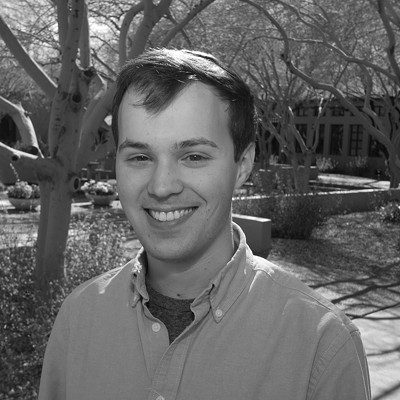NextGen America, founded by liberal billionaire Tom Steyer, launched a campaign to get a clean energy measure on the Arizona ballot this fall. But you wouldn't know it based on the campaign's public relations strategy, which frames the initiative as the product of a local coalition.
NextGen goes unmentioned, as does Steyer. So should voters have been informed that NextGen was bankrolling the measure?
Attorneys fought over that question during oral arguments in Maricopa County Superior Court on Monday.
Lawyers for an opposition committee funded by utility company Arizona Public Service sparred with attorneys for the clean energy measure, as the clean energy foes desperately tried to kill the measure before it secures a spot on the November ballot.
Attorneys for an opposition committee called Arizonans for Affordable Electricity – which has received $7.5 million from APS parent company Pinnacle West – have filed a lawsuit to strike the measure from the ballot, citing several issues with the petition drive.
They argue that nearly 80 percent of the campaign's 480,000 signatures are invalid, and that the campaign failed to properly identify its sponsor: NextGen.
NextGen was founded as NextGen Climate by Steyer, a hedge fund billionaire and Democratic mega-donor. A vocal opponent of President Trump, Steyer has waged a controversial campaign to impeach the president.
Because NextGen has served as the sole funder and organizational driver behind the Clean Energy for a Healthy Arizona campaign, the opponents argue, the committee's name should have reflected that NextGen was the sole sponsor.
When the Clean Energy campaign launched in February, representatives downplayed the ties to NextGen. At the time, a NextGen spokesperson suggested that local coalitions in Arizona, Michigan, and Nevada all came up with the idea for a clean energy mandate independently of NextGen.
If the Clean Energy for a Healthy Arizona initiative succeeds, it will amend the Arizona Constitution to require the state's public utilities to generate 50 percent of their electricity from renewable sources including solar and wind by 2030.
Brett Johnson, an attorney for the opposition committee, argued in court that the rule for disclosing an initiative's sponsor is "very, very clear."
“If the NRA is coming to town, and they’re going to pass an initiative, NRA needs to be within the name of the organization. If the Sierra Club is, same exact situation," Johnson told Judge Daniel Kiley.
The Clean Energy campaign failed to comply in two respects, the opponents argued.
For one, the Clean Energy campaign committee listed a nonexistent LLC when the campaign filed a statement of organization on February 9. Paperwork to create that LLC wouldn't get filed until over two weeks later, on February 27.
Even more pointed is the second accusation in the lawsuit, which says that the Clean Energy campaign used its LLC as a "shell" company to hide NextGen's involvement. All the while, NextGen poured money into the Clean Energy committee, as opposed to the committee raising money on its own.
According to the Clean Energy campaign's latest campaign finance filing, NextGen has funded the Arizona initiative with over $4.4 million in contributions.
Deciphering the involvement of an unnamed political organization should not be the responsibility of "people who oppose an out-of-state body coming to Arizona," Johnson argued in court.
The name of the Clean Energy committee should have included a reference to NextGen when they filed the initiative, he said. If a group with a repugnant agenda wanted to pass an initiative in Arizona, Johnson theorized, voters would obviously want to know the name of the group spearheading the ballot measure.
For what it's worth, Johnson didn't address whether voters might also want to know that the parent company of APS has waged a big-money war against the Clean Energy initiative, funneling millions to the opposition committee that he represents.
An attorney for the Clean Energy campaign conceded that for a few weeks in February, the initiative had no sponsor.
“We don’t dispute that there was a period of time when there was no sponsor listed," Jim Barton told the judge. "Nor do we dispute that we added the LLC after the LLC was formed.”
“I don’t think it matters," he added.
Even if the campaign had no sponsor at first, Barton argued, this sort of violation should be addressed through the attorney general issuing a fine – not by the wholesale striking of signatures, which would effectively kill the initiative on a technicality.
Plus, Barton said, the opponents allege that NextGen was the de facto "sponsor" simply because Steyer's group donated money, but by that logic, everyone who donates to a campaign committee qualifies as a "sponsor," in a way.
"That would be a very unusual way to read ‘sponsor,’ because each person who gave then would also be a sponsor. Any person who gave money – you’d have all kinds of sponsors," Barton said.
Every dollar that was contributed to the Clean Energy campaign was disclosed in the campaign finance reports, Barton emphasized.
The arguments on Monday also dealt with the opponents' request that county recorders pore over hundreds of thousands of individual signatures from the 480,000-plus submitted by the Clean Energy team.
County officials have described that as an unprecedented task. Ordinarily, recorders review a 5 percent sample of a ballot measure's signature total, and use the validity rate from those results to judge the entire batch.
Jessica Sabo, an attorney representing Yavapai County, told Judge Kiley that county recorders do not even have the authority for the broad signature review demanded by the clean energy opponents.
“My understanding is that there has never been a line-by-line check – requested or completed – on an initiative," Sabo concluded. "And that is all that I have to say.”
Kiley was hard to read during the arguments.
The judge occasionally prodded the two sides on their logic, and at one point pushed for a specific timeline of dates during the discussion of the Clean Energy campaign's paperwork, or lack thereof.
The parties set a status conference for later this week, but Kiley gave no indication of when or if he might grant a summary judgment in advance of a trial, currently scheduled for August 20.
[
{
"name": "Air - MediumRectangle - Inline Content - Mobile Display Size",
"component": "18478561",
"insertPoint": "2",
"requiredCountToDisplay": "2"
},{
"name": "Editor Picks",
"component": "16759093",
"insertPoint": "4",
"requiredCountToDisplay": "1"
},{
"name": "Inline Links",
"component": "17980324",
"insertPoint": "8th",
"startingPoint": 8,
"requiredCountToDisplay": "7",
"maxInsertions": 25
},{
"name": "Air - MediumRectangle - Combo - Inline Content",
"component": "16759092",
"insertPoint": "8th",
"startingPoint": 8,
"requiredCountToDisplay": "7",
"maxInsertions": 25
},{
"name": "Inline Links",
"component": "17980324",
"insertPoint": "8th",
"startingPoint": 12,
"requiredCountToDisplay": "11",
"maxInsertions": 24
},{
"name": "Air - Leaderboard Tower - Combo - Inline Content",
"component": "16759094",
"insertPoint": "8th",
"startingPoint": 12,
"requiredCountToDisplay": "11",
"maxInsertions": 24
}
]












